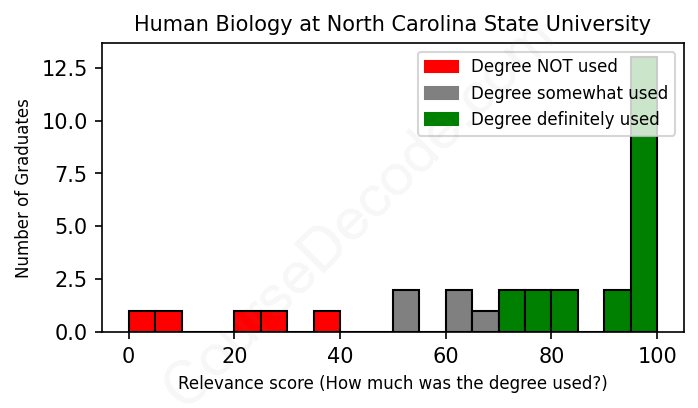
First, some facts. Of the Human Biology graduates from North Carolina State University we've analyzed , here's how many have used (or NOT used) their degree in their career:

These are estimates based on AI analysis of 31 LinkedIn profiles (see below).
The verdict? Above average. Overall, with an average relevance score of 75%, Human Biology graduates from North Carolina State University have a higher likelihood (+8%) of finding work in this field compared to the average graduate across all fields:
And for comparison, here's the chart for all profiles we've looked at across all degrees.
Also, after graduating, 61% of these graduates have pursued further education other than another Bachelor's degree (such as a Masters degree or other), compared to the average across all profiles of 35%. This suggests you may need more than just a Bachelors degree to be competitive as a Human Biology graduate.
See the details:
|
Relevance score: 100% We think this person has gone into a career highly relevant to their degree. We think this person has gone into a career highly relevant to their degree.
DEGREE INFOGraduated in 2013 from North Carolina State University with a Bachelor of Science in Human Biology. Also pursued further education since (see below). JOB HISTORY SINCE GRADUATIONShadow/Clinical Internship Dr. Giles Willis, DDS Feb 2013 - Jun 2013 FURTHER DEGREES DONE SINCE GRADUATINGDoctor of Dental SurgeryUniversity of North Carolina at Chapel Hill School of Dentistry 2014 - 2018 ABOUTDe'Ja Alexander is a native of North Carolina. She earned her Bachelor of Sciences from North Carolina State University. Upon graduating from North Carolina State University, she took a year off to gain some more dental experience. Currently, she is a Doctor of Dental Surgery Candidate at UNC's School of Dentistry. |
The top 10 most common jobs done by the graduates we've analyzed (ranked most common to least) are:
When looking at the career paths of people who graduated with a degree in Human Biology from North Carolina State University, you'll notice a mix of jobs, but some roles pop up more frequently than others. A significant number of graduates have pursued careers as Physician Assistants and in various medical roles such as medical assistants, EMTs, and physical therapists. These positions almost always require a deep understanding of human biology and anatomy, which directly aligns with their degree. For example, EMTs and Physician Assistants are heavily involved in patient care where their knowledge of human biology is crucial. Also, a considerable number have taken on roles in physical therapy, where they apply what they learned about the body's mechanics and physiologies, showing a clear connection to their studies.
On the flip side, not all jobs are directly relevant to the Human Biology field. Many graduates ended up in positions like administrative roles or clinical trial management, where the core focus is more on operations rather than applying in-depth biological knowledge. For instance, roles in project management or finance don't utilize the scientific knowledge gained from their degree, indicating that while some graduates stick closely to human biology, others branch out into broader career paths that may or may not relate back to their major. Overall, the trend leans toward graduates finding jobs that are relevant to their studies, especially in healthcare, though there's a notable variety in how directly the role connects to human biology principles.
Here is a visual representation of the most common words in job titles for Human Biology graduates (this is across all Human Biology graduates we've analyzed, not just those who went to North Carolina State University):

So, it looks like people who graduated with a degree in Human Biology from North Carolina State University have generally ventured into some pretty interesting and relevant career paths! Right after graduation, many of them kick-start their careers in healthcare-related positions like Certified Nursing Assistants, Medical Assistants, or even EMTs. These roles are a great way to get hands-on experience in the medical field, and they seem to lead well into more advanced positions over time. For example, several graduates eventually become Physician Assistants or even Resident Physicians, which is awesome and definitely shows that their degree is paying off! It’s clear that many of these folks are genuinely committed to healthcare and are progressing in a field where they can make an impact.
Fast forward 5 to 10 years, and it’s exciting to see that a lot of them are in solid roles that capitalize on their Human Biology background. Many alumni have taken on positions like Clinic Directors, Senior Scientists, or Clinical Research Associates, showcasing a trajectory that evolves from entry-level jobs into more responsible and specialized roles. While there are a few who have branched out into unrelated fields like real estate or sales, they seem to be the exception rather than the norm. Overall, these graduates are finding success and relevance in their careers, primarily staying connected to healthcare or research, which is a testament to the value of their education at NCSU!
A Bachelor’s degree in Human Biology at North Carolina State University can be a pretty challenging program, but it really depends on your interests and strengths. You'll be diving deep into subjects like biology, anatomy, and genetics, which can be intense if you're not super into science. The coursework often involves a mix of lectures, lab work, and maybe some group projects, so it requires not just memorization but also critical thinking and application of concepts. If you enjoy science and are willing to put in the work, you might find it manageable, but if those subjects aren't your thing, it could definitely feel like a heavy load. Overall, it's about average in difficulty for a science-related degree, so just be prepared to hit the books and stay organized!
Most commonly, in the LinkedIn profiles we've looked at, it takes people 4 years to finish a Bachelor degree in Human Biology.
So, looking at these Human Biology grads from NC State, it seems like there’s a pretty wide range when it comes to their earnings. You’ve got some folks, like the resident physicians and physician assistants, who are likely pulling in solid salaries—definitely higher-end for entry-level jobs, especially in healthcare. But then, there are also quite a few people in roles like medical assistants and coordinators, which typically don’t pay as much, especially early in their careers. Overall, it looks like while some have landed on the money-making side of things, others are probably just making decent living wages, which might not be too flashy. So, it really depends on the specific job and path each of them has taken!
Here is a visual representation of the most common words seen in the "about" section of LinkedIn profiles who have a Bachelor degree in Human Biology (this is across all Human Biology graduates we've analyzed, not just those who went to North Carolina State University). This may or may not be useful:

Here are all colleges offering a Bachelor degree in Human Biology (ordered by the average relevance score of their Human Biology graduates, best to worst) where we have analyzed at least 10 of their graduates:
| College | Score | Count |
|---|---|---|
 Indiana University Bloomington Indiana University Bloomington
|
95 | 10 |
 University of California San Diego University of California San Diego
|
89 | 20 |
 UC San Diego UC San Diego
|
89 | 18 |
 University of California, San Diego University of California, San Diego
|
86 | 16 |
 Stanford University Stanford University
|
84 | 10 |
 University of California, Merced University of California, Merced
|
84 | 16 |
 University of Wisconsin-Green Bay University of Wisconsin-Green Bay
|
79 | 10 |
 North Carolina State University North Carolina State University
|
75 | 31 |
 Michigan State University Michigan State University
|
71 | 48 |
 The University of Texas at Austin The University of Texas at Austin
|
69 | 17 |
 University at Albany, SUNY University at Albany, SUNY
|
69 | 15 |
 Hunter College Hunter College
|
60 | 14 |
 University of Southern California University of Southern California
|
58 | 16 |